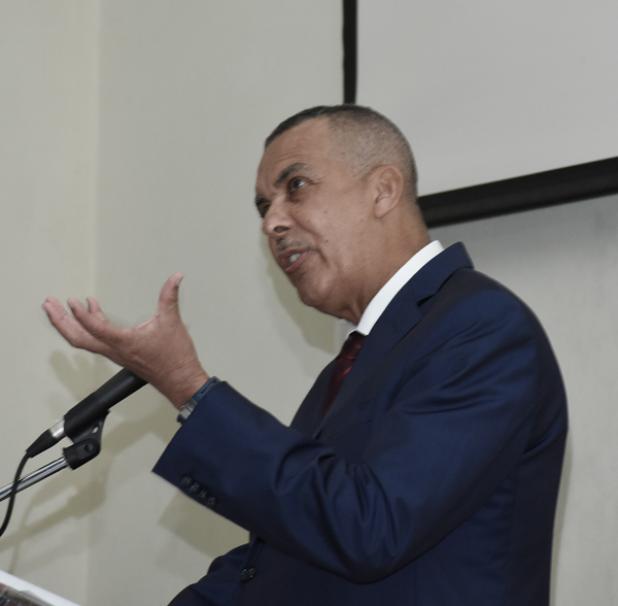
President of Trinidad and Tobago, Anthony Thomas Aquinas Carmona delivering his lecture.
‘Cult politics’ hindering progress
The leader of a Caribbean nation is saying that while there is a growing concern throughout the region about the level of “cult politics” being practised, it is up to the future leaders of tomorrow to unburden the heavy shoulders of Caribbean politics.
It is the opinion of the President of Trinidad and Tobago, Anthony Thomas Aquinas Carmona, that it is no longer a case of Caribbean citizens asking what they can do for their countries, but rather what they can do for their political party and what the party can do for them.
He stressed that through cult politics, “we engage in spinelessness” and mindless alliances and allegiances which have kept back the region from progressing.
“This is where we reach. We suffer from this selfless agenda of cult politics, which has become the order of our Caribbean day. National goals and needs become secondary, yet even subservient to political goals.
“And this type of insular culture must not have any place in progressive democracies. Cult politics blurs people’s sense of right and wrong, and in face of what is sometimes patently wrong or dubious, it encourages an unholy alliance with science,” he said.
The President made these remarks recently at the 2017 UWISTAT President’s Lecture titled “Youth and Caribbean Identity: Redefining Caribbean Pride for the 21st Century Youth”, at the Henry Fraser Lecture Theatre, University of the West Indies, Cave Hill Campus.
During the powerful message, President Carmona told the young intellectuals that the battle to establish a meaningful regional identity and purpose in an increasingly global village, remains a war that can be won by recognising that as young people, that crucible of transformation for Caribbean integration rests firmly in their hands.
He noted that the internationalisation of the Caribbean man and woman would make West Indians equal partners on the world stage, in the areas of social, economic and political transformation.
However, the former High Court Judge made it clear that before “we assume our rightful place; the Caribbean region has to engage in its own drastic domestic change – in economics, politics and human development”.
He said the region needs to get its act together and return to a place of order, production and tolerance steeped in discipline, noting that Caribbean integration and unity suffer from various imponderables, including geographic size, literacy rates, limited resources and an ever present vulnerability to international monetary policies steeped in skewed Gross Domestic Product logic. He also lamented what he called a continuing malaise of non-competitiveness, the result of poor work ethic and agitated trade unions living in the 70s and 80s.
He indicated that decisions and policies are made and invoked at CARICOM regional meetings, but are not given the light of day to begin the process of operationalization.
President Carmona also urged the future leaders to define a new politics in the region, by a more inclusive culture of genuine participation with the appropriate competencies, adding that there is a need for the constant pantomime that takes place when an election is won, and when an election is lost, to be stopped.
“As victor, we are accustomed to immediately triggering the power of replacement and termination. Over the years, I have noticed throughout the Caribbean, people on boards and management positions are generally replaced without referencing the need for continuity and institutional memory.
“This kind of politics is regressive, and this philosophy that I must put my people there must end. You must both keep, and put people that are competent, skilled, visionary and independent with integrity. If all of these skill sets are determined by one’s political allegiance, then crapo smoke we pipe, in this beloved Caribbean or ours.”
Nevertheless, the President said he has the eternal hope that change is possible and necessary because “as Caribbean people we have had much success and hope” through sports, culture and education.
(AH)
